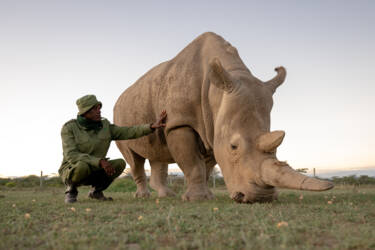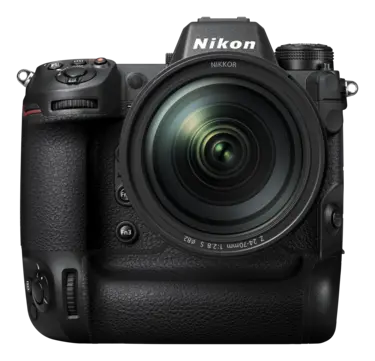Ethical wildlife masterclass with Lara Jackson

To celebrate the launch of our NIKKOR Z 180-600mm f/5.6-6.3 VR lens, we sat down with wildlife photographer and conservation biologist Lara Jackson to chat puffins and lions, ethical photography and being reactive to your surroundings
Lara Jackson’s love for wildlife began at an early age, when she would walk through woodlands thick with bluebells. Now a conservation biologist, wildlife photographer, author, presenter, and Nikon creator, she unravels how to elevate your professional wildlife photography.
Don’t be afraid of trial and error
A self-taught photographer, Lara shot only in automatic for the first two-and-a-half years of her photography journey. “I developed my creative eye quite quickly as I didn’t have to worry about camera settings,” she explains. “Then, as I progressed in my photography career, I started shooting manual.”
In 2019, on a trip to South Africa to teach students how to collect wildlife data and monitor population, Lara started shooting in manual. “I thought to myself, ‘For this entire trip, I’m going to put my camera into manual and figure it out.’ By the time the trip ended, I knew how to shoot in manual,” she says. “It was certainly trial and error, using what I have in front of me and figuring it out on the go.”


Mix zoom with primes
“I have the amazing Nikon Z 9, which is mind-blowing. For lenses, I use the NIKKOR Z 70-200mm f/2.8 and I also have the NIKKOR Z 100-400mm f/4.5-5.6 VR S,” says Lara. “I much prefer using the 70-200mm zoom as the quality of the image is far superior because of the fast aperture.”
In February earlier this year on a trip with Nikon, Lara visited Dovrefjell, Norway, with fellow wildlife photographers Rachel Bigsby, Lina Kayser, and Eeva Mäkinen. There, she borrowed the NIKKOR Z 600mm f/4 TC VR S. “The inbuilt teleconverter increases the focal length to 840mm, which was fantastic when I was photographing the famous musk oxen,” Lara explains. “They are such big animals and have quite unpredictable behaviour. At one point we were photographing two males who were fighting with each other, so we certainly didn’t want to get too close! It was great to have the range to be able to shoot from far away.”
Having both primes and zooms comes at a premium, says Lara, but don’t be afraid to mix it up if you can. Plus, any zoom lens with a long focal length is a great entry level into wildlife photography.
“There’s a saying isn’t there,” Lara smiles. “The best camera you have is the one in your hands. So, whatever kit you have, make the most out of it.”


Always be ethical
“Ethical wildlife photography for me is about never ever disturbing the animal. It’s never enforcing your presence into their personal space,” Lara explains. “The whole idea of wildlife photography is capturing natural behaviours and, if the animal is stressed, or aware of your presence, or you’re doing something you shouldn’t be, then you’re not going to see that behaviour. I don’t believe anything is worse than stressing an animal out. I’d rather miss the shot. Even if it was a once-in-a-lifetime shot that was going to win me 100 awards around the world, I would rather miss it than know that I’ve negatively impacted that animal.”
Social media posts can often unfavourably straddle the boundaries of ethical photography, says Lara, especially with regards to drones. “It’s crucial we have as minimal effect on the wildlife we’re photographing as possible,” she says.
You can watch Lara and George Turner’s guide to respectful wildlife photography below.

Respectful wildlife photography with Nikon Creators Lara Jackson and George Turner
Click the button to play
A good shot is impactful
“There are millions of images of puffins or lions and elephants on the internet so what I look for is anything that will create impact or provoke an emotive response,” says Lara. “I like to photograph interesting behaviour in the animals.”
Lara loves to shoot puffins on Scotland's Treshnish Isles, off the Isle of Mull where she lives. “In May there was an abundance of these gorgeous pink sea thrift flowers, so I wanted to create bokeh in the foreground to frame the puffins,” smiles Lara. “I’m constantly watching them, looking for any interesting behaviours, always thinking, ‘How can I make this different? How can I make this stand out?’”


Increase your shutter speed
Camera settings depend on the animal shooting and the weather. “I often have no set settings,” Lara explains. “I like to have my aperture wide open because I like quite minimalist shots where the subject is sharp, but the background is blurry. In terms of shutter speed, it depends on the subject but, when I shoot a puffin in flight, my shutter speed is high so it’s nice and sharp.
“Puffins spread their wings when they’re perching, and their heads are completely still for about three seconds. In this case, I slow my shutter speed down because I want to have the head sharp, and the wings blurred.”
Discover the new NIKKOR Z 180-600mm f/5.6-6.3 VR
Featured products
Uncover NIKKOR lenses
Travel into space with the NIKKOR Z 14-24mm f/2.8 S

For limitless creativity










